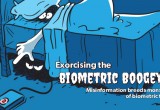Florida considers law to protect digital assets after death
09 February, 2015
category: Digital ID, Government
The Florida lawmaker who pushed through a bill to ban the use of biometric data in Florida schools now wants to protect the digital assets of the deceased. Those assets include emails, text messages, online photographs, documents stored in the cloud, electronic bank statements, and social media accounts.
Sen. Dorothy Hukill’s bill would allow individuals to designate a personal representative to access and control their digital assets after they die or can no longer handle their affairs. The bill states that the designated fiduciary – personal representative, legal guardian, etc. – is deemed to have the lawful consent of the account holder to handle the deceased’s electronic communications.
This proposal would be a state adaptation of federal law. “There are approximately eight states that have been dealing with the issue of digital assets, and most recently Delaware passed a law last year which is very similar,” Hukill explained to the Florida Senate Judiciary committee. “This bill sets out very clearly that you are in charge, that you determine who should have access to your accounts. I don’t want Google or Yahoo or any of them deciding what happens.”
Hukill says the bill does not permit invasions of privacy by fiduciaries because they have to comply with the same legal standards of conduct that have long been in place. As an example, she noted that a personal representative cannot access the medical files of a deceased psychologist, whether those documents are in a filing cabinet or online.
“This actually is very positive for all of the providers because it standardizes the procedure just like we have now under probate law,” says Hukill, who is also an attorney. “We know what the personal representative is supposed to do, we know what their obligations are, we know the standards they’re held to, (but) that is not what is happening in the digital world now.”
Hukill’s bill has more committees to pass before being heard by the full Senate and House.



